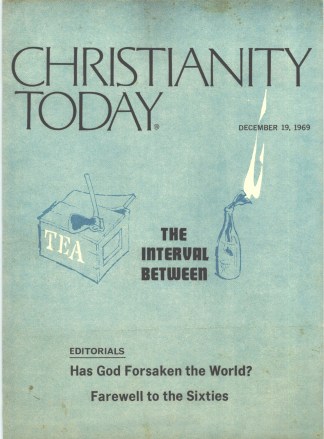Take a hundred artists in films, television, radio, music, writing, and painting. Mix them with a handful of psychiatrists, public-relations people, a swinging Catholic priest, and a long-haired rock singer. Place them together for three days in a plush desert spa. The result? A tempestuous explosion of ego and revelry? Not when the group is the Fellowship of Christians in the Arts, Media, and Entertainment.
Holding its third national conference in Palm Springs, California, last month, the fellowship took a hard look at today’s communications revolution and sanely considered how Christian artists can better penetrate the secular mass media with the Christian message.
Melvin Lorentzen, Wheaton College writing specialist and executive director of the Bedford Center for Creative Study, urged conferees to invade the mass media, buoyed by the realization that the artist provides insights into reality spurred by the Word of God. “The Christian philosophy of art,” he said, “must be rooted in the Word of God, which abides when all else withers and falls.”
Kenneth Talbott, information coordinator for Armed Forces Radio Service, stressed the need to understand the youth communications revolution. He presented a new film by John C. Broger, who heads the Pentagon’s overseas broadcasting system for 1.5 million GI’s. The film analyzed how rock music and lyrics, psychedelic-style posters, complex symbolic art forms, and a growing underground newspaper network are successfully communicating anti-government, antiracism, anti-draft, pro-drugs, pro-Oriental philosophy, and pro-sexual promiscuity messages.
To open the channels between generations, Broger recommended that communicators find out how to plug into youth communications methods, utilize modern technology effectively—and patiently speak truth.
A variety of new works were presented to the fellowship. “Opus for Contemporary Decision,” a blending of soft rock and traditional choral structures by Ted Nichols, music director for Hanna-Barbera films and California State College at Los Angeles, was enthusiastically received. A milder response greeted “Tell It Like It Is,” a Christian musical package by Ralph Carmichael and Kurt Kaiser soon to be aired on NBC television. (Conferees questioned whether it really “told it like it is” in the rock idiom.)
The musical high point of the conference was the performance of guitar-strumming Larry Norman, who sang original numbers from his soon-to-be released Capitol album, “Upon This Rock.” With long blonde hair almost reaching a sweat shirt imprinted with the words “Dearly Beloved,” Norman captured hearts by his exciting talent and simplicity of spirit.
Conference chairman Irvin Yeaworth, Jr., of Valley Forge Films, showed his latest motion picture, Way Out, a moving portrayal of the effects of heroin addiction, featuring as actors eight former addicts whose lives were transformed by faith in Christ. To those who despair of the low artistic quality of Christian films, Yeaworth’s excellent production gave great hope of future things. Conferees gained further inspiration for cinematic creativity from Saul Bass’s innovative film, Why Man Creates.
The principal speaker from the television field was Bob Tamplin, executive producer of the Leslie Uggams, Jonathan Winters, and Carol Burnett shows. He encouraged Christian organizations to increase their budgets for prime-time television programming capable of meeting competition from secular shows.
Accomplished British actor Nigel Goodwin enthralled the fellowship with readings from Albert Camus and Dylan Thomas.
The Palm Springs conference marked another step forward for Christian witness via the arts. With the Metropolitan Opera’s Jerome Hines, film producer Yeaworth, Wheaton’s Lorentzen, and Westminster Choir College president Ray Robinson leading the way, the Fellowship of Christians in the Arts, Media, and Entertainment hopes to attract more professionals to its ranks, and to make Christ known in our day.
ROBERT L. CLEATH










